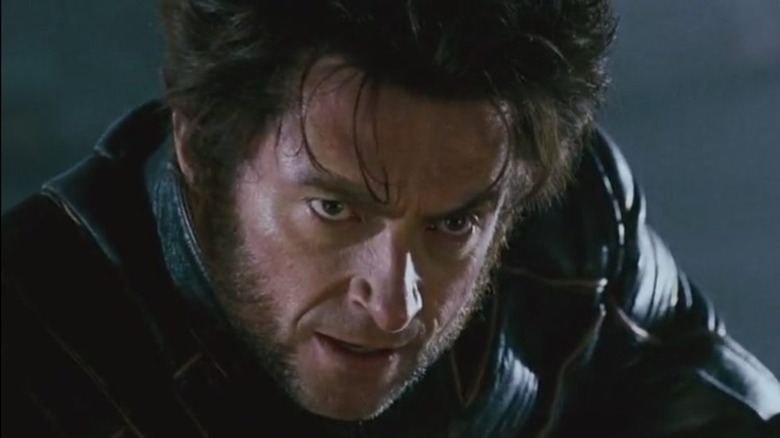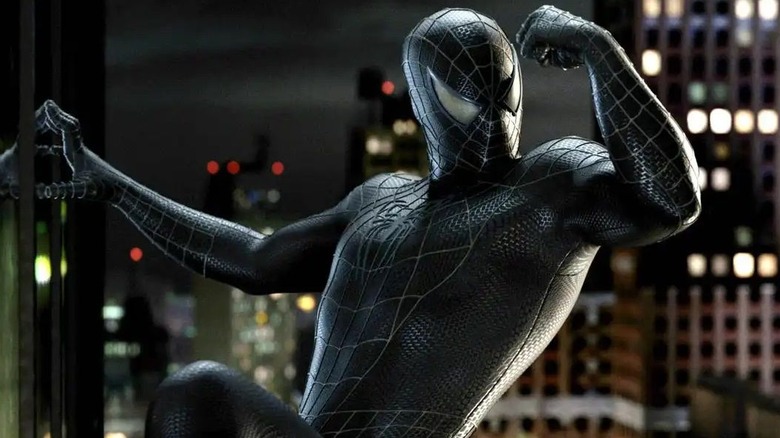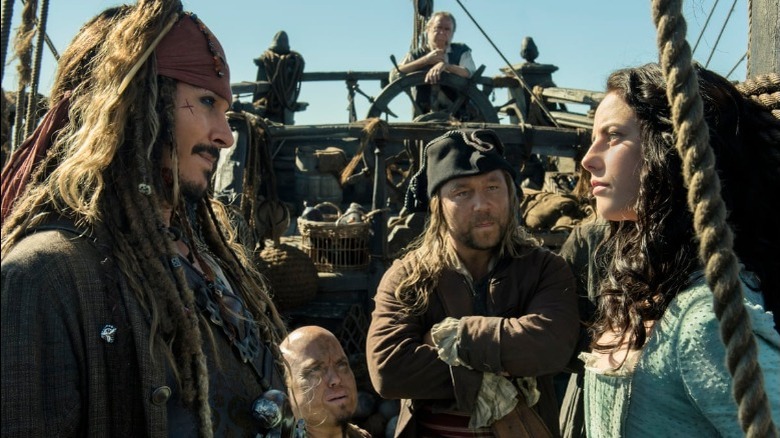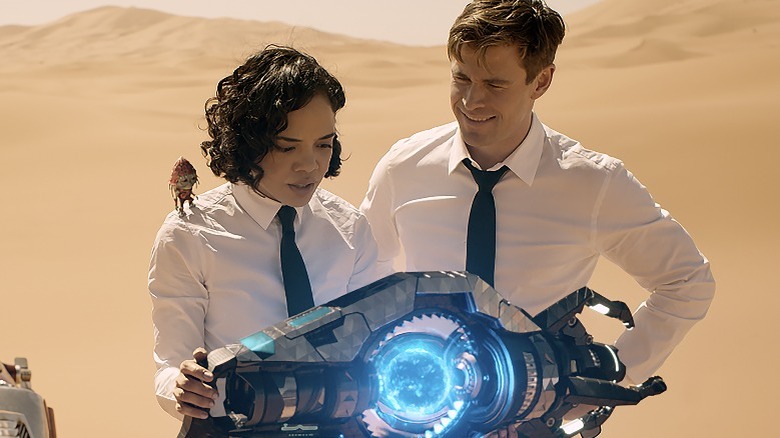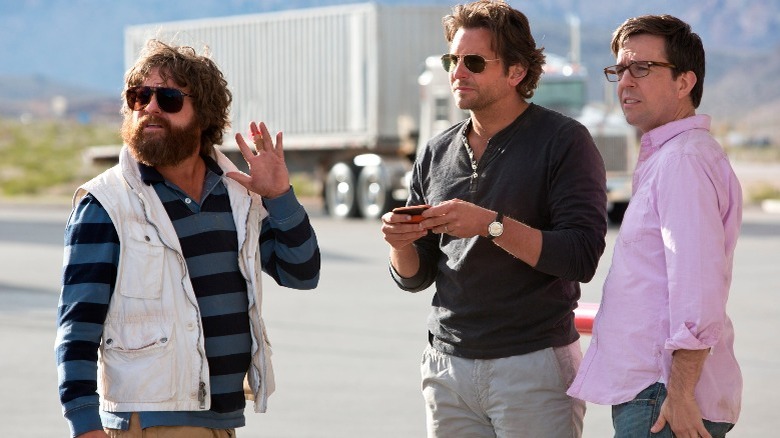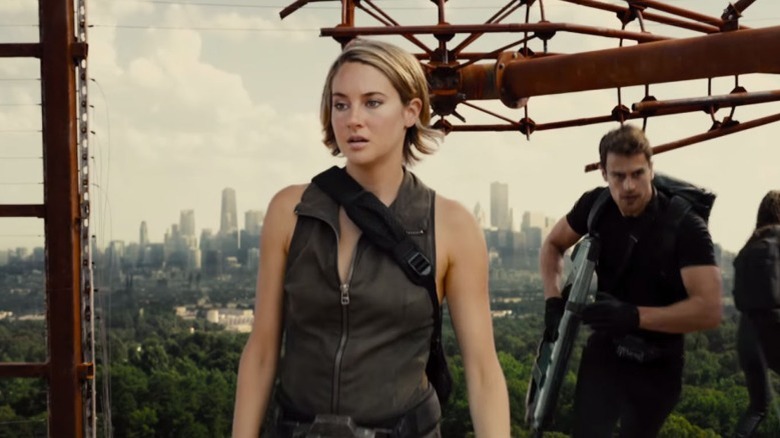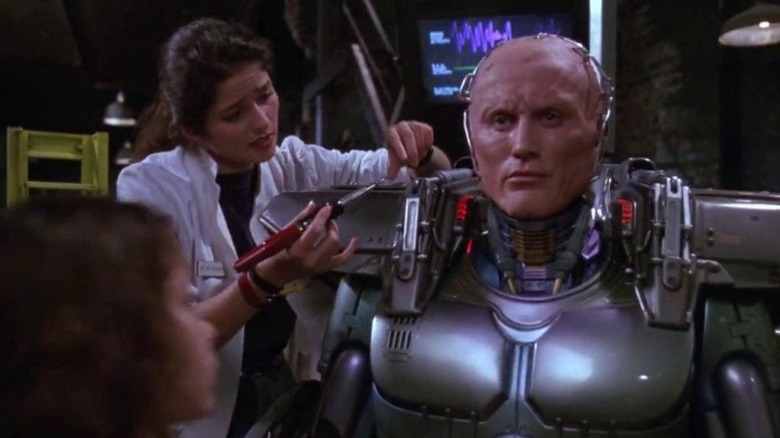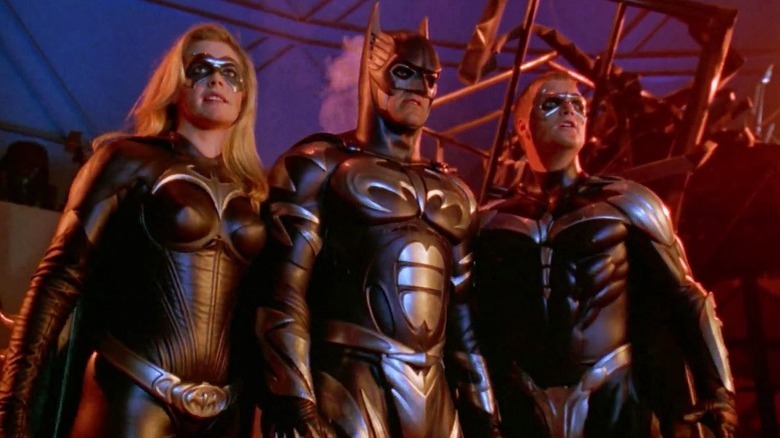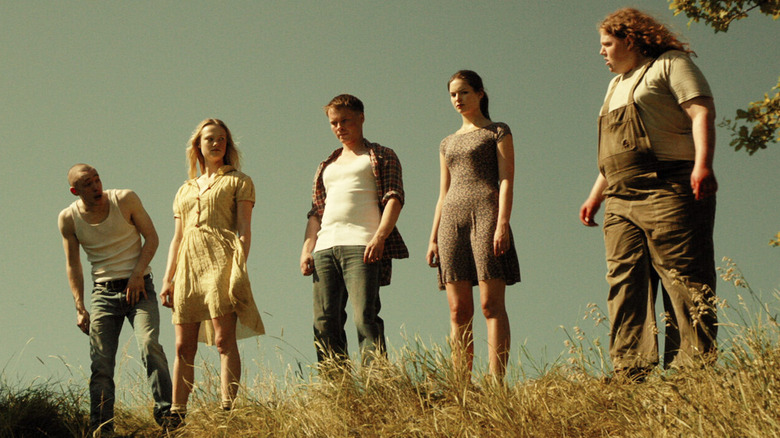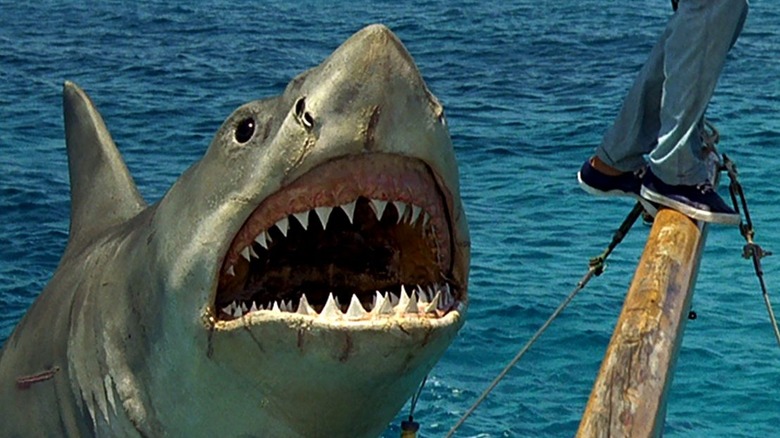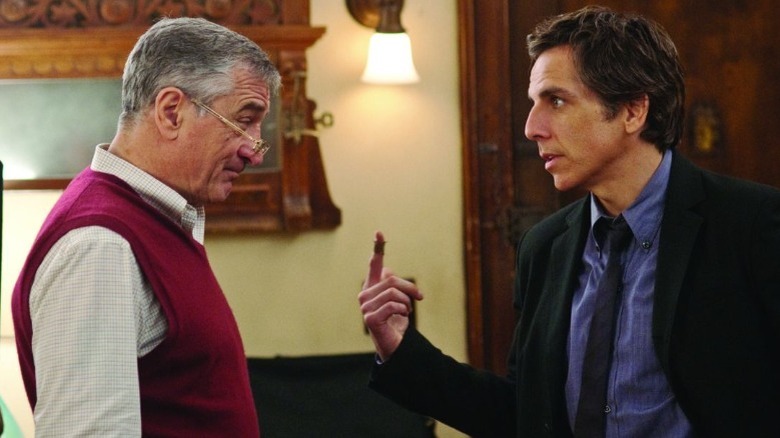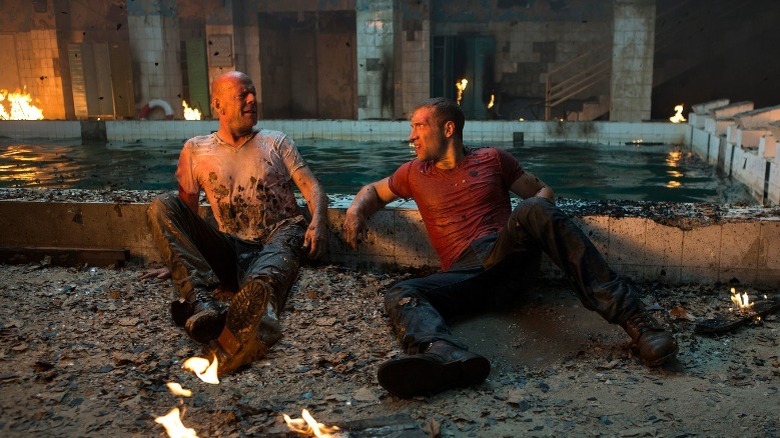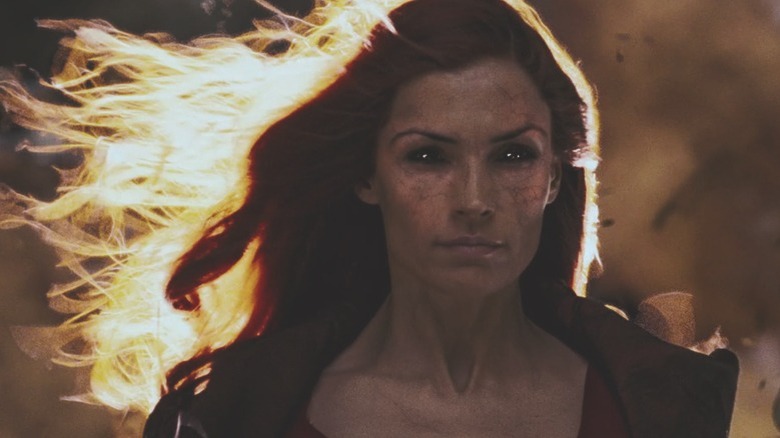Movie Series That Ended In A Train Wreck
There's something undeniably thrilling about discovering a new franchise. There's real magic behind finding a new set of characters embarking on amazing new adventures, all the while realizing that there are plenty more journeys to come. Franchises like "Mission Impossible," "Mad Max," and "Fast and the Furious" have had continued box office and critical success over decades, and fans continue to return with fevered excitement for each new installment.
Sometimes, however, a franchise can spoil the immense promise a first (and sometimes second, third, and more) film can create, and one truly terrible installment can derail everything. Sometimes you can see the trainwreck from far away, as a movie series gets progressively worse as it goes along, while other times it's a shock, and an exciting movie franchise is ruined by one ghastly endeavor. With this in mind, let's take a look at those once exciting movie franchises that were ruined by a truly terrible film. Here are movie series that ended in a train wreck.
Spider-Man 3
Spider-Man has received an awful lot of attention in the 21st century, with eight films all about everyone's favorite web-slinger (and a ninth being released in the coming weeks). It all started with Sam Raimi's "Spider-Man," the Tobey Maguire-led success that raked in over $825 million at the global box office. The second film in Raimi's trilogy was every bit as successful, but "Spider-Man 3" is an entirely different story. While the film was a commercial success, the critical and fan reception was a different story. Everything feels rushed — particularly by bringing two new villains into the fray — and nothing really lands. Worst of all, "Spider-Man 3" fundamentally rewrites an essential part of our hero's character.
Changing Uncle Ben's death circumstances fundamentally changes who Peter Parker is and why he does what he does. Making it no longer his responsibility takes away so much of what makes him a fascinating hero — especially the fact that he's capable of grave mistakes. Perhaps it's unsurprising that "Spider-Man 3" almost feels it comes from a completely different series, as director Sam Raimi claims he didn't have creative control over the film. All the bizarre, frankly unhinged emo strutting down the streets of New York City can't save "Spider-Man 3" from being a disaster, and it's only worse when you realize it took all the immeasurable promise of "Spider-Man 2" and threw it in the dumpster. It's no wonder we never saw a fourth film in the Raimi-verse.
Pirates of the Caribbean: Dead Men Tell No Tales
How the mighty have fallen: "Pirates of the Caribbean: The Curse of the Black Pearl" took its origins as a theme park ride and turned out a smash hit, earning over $650 million at the international box office. It also gave us the legendary Captain Jack Sparrow (Johnny Depp) and a cast of beloved pirates that made the film — and franchise — an instant fan-favorite. That is until patience started to wear thin, with increasingly complex stories and overlong films that confused audiences more than it delighted them. It all came to a crushing blow with "Dead Men Tell No Tales," the fifth entry into the "Pirates" series that received the franchise's worst reception thus far, earning 30% approval on Rotten Tomatoes.
Despite the film's numerous shortcomings, it is worth noting that "Dead Men Tell No Tales" is a sight to behold. The visual effects are simply world-class, and the film features some of the most impressive water effects in cinema. While that doesn't make up for a convoluted plot and everyone acting (except for Javier Bardem) bored out of their minds, at least fans had something nice to look at while watching the fifth pirate adventure.
Men in Black International
If this were a ranked list of films absolutely nobody asked for, "Men in Black International" would likely be right at the top. "Men in Black," starring Will Smith and Tommy Lee Jones, was something of a surprise smash-hit, earning a humongous $589 million at the worldwide box office, which is incredible for an original film. The film even won an Oscar for best make-up — a well-deserved reward for some truly tremendous work. The series continued with "Men in Black II" in 2002, and the third and presumably final film, "Men in Black 3," was released in 2012, and all was fine with the world.
At least, until "Men in Black International" found its way into cinemas in 2019. With Smith and Jones nowhere to be found, the franchise turns its focus to Agent H (Chris Hemsworth) and Agent M (Tessa Thompson). While the two certainly have chemistry (as seen in "Thor: Ragnarok"), the story feels incredibly generic aside from some cool gadgets and creatures, and the whole thing grinds to a halt far too often. The film received a swathe of negative reviews and by far the worst box office performance of the series. "International" is best summarized by Nick Pinkerton of Sight & Sound, who says the film has "nothing in it to command the attention of an adult with a functioning visual cortex."
The Hangover Part III
It actually makes a lot of sense that a movie like "The Hangover" launched a film series. The movie, released in 2009, surprised just about everyone with its success, spinning its modest budget into the sixth highest-grossing film of that year. It made a household name out of Todd Phillips — who went on to direct films like "Joker" — and launched the career of actor Zach Galifianakis into super-stardom. It was popular with critics, too, earning a 78% approval rating on Rotten Tomatoes, which is especially impressive for a raunchy comedy. So it wasn't much of a surprise when "The Hangover Part II" was announced, even if its plot is nearly identical to the first film.
Credit where credit's due: At least "The Hangover Part III" tries to take the series in a fresh direction. Unfortunately for fans, the film forgets it's supposed to be a comedy and becomes more of a dark action thriller — something it does not succeed at. As Russ Fischer at /Film observes, the film is "almost a provocation, a bitter explosion of the very concept of the sequel." With fans and critics united on how disappointing the third film was, it's no surprise that "Part III" is almost certainly a disappointing ending to a once-promising series.
The Divergent Series: Allegiant
Sometimes a film can be so bad that it stops an entire franchise dead in its tracks. When this does happen, it tends to be the very first film in a planned franchise that just doesn't perform as well as studios predicted. In the case of "The Divergent Series: Allegiant," the series made it right to the end before its final part was shelved. There are quite a few reasons this disappointing young-adult film series got the axe, including the decision to split the "Divergent" sequel into two films. What the studio executives apparently didn't plan for, however, was the fact that "Allegiant" would be such a dreadful film that plans to make the second part would be scrapped.
"Allegiant" performed very poorly, earning just $66 million at the domestic box office, making less than half the earnings of its predecessor, "Divergent." Just like the fans, critics roundly rejected the film, as "Allegiant" holds an embarrassing 11% approval rating on Rotten Tomatoes. When watching the film, it is pretty clear to see why "Allegiant" is so bad — the story is confusing at best and utterly nonsensical at worst, and the special effects are uninspired and downright ugly. Despite boasting an impressive cast featuring Shailene Woodley, Octavia Spencer, and Naomi Watts, everyone looks bored, almost as if they knew exactly how much of a mess they were in at the time of filming.
Robocop 3
With a 90% approval rating on Rotten Tomatoes, Paul Verhoeven's "Robocop" was a huge success, intelligently blending hyperviolent action with incisive satire. The film is so loved that it's regularly discussed as one of the best action films of the 1980s. While some films from previous decades struggle to hold up in contemporary times, the original "Robocop" definitely still holds up. The same certainly cannot be said of "Robocop 3," a brutal end to a once-thrilling character. In fairness, though, the film was never good in the first place.
"Robocop 3" marked a huge change in tone from its predecessors, switching up the dark satirical aspects of the previous entries and replacing them with a more typical police procedural. The film really suffers from its low budget and hokey acting, and Peter Weller's absence as the titular Robocop is sorely felt. Perhaps most egregious of all is the drop in rating from R to PG-13, which took away the extreme violence that was a known staple of the "Robocop" series. It's perhaps no surprise, then, that "Robocop 3" was a financial misstep, barely making back its small $22 million budget. Fans and critics alike also hated it — "Robocop 3" has a truly embarrassing 6% approval on Rotten Tomatoes, and the audience score of 15% isn't much better. All the (ugly) flying robots in "Robocop 3" couldn't reignite the magic of the original, and the film strays too far from what made the first film special.
Batman & Robin
Just like "Robocop 3," "Batman & Robin" gave audiences a major tone change, taking the darker elements of the previous Batman films and replacing them with cartoonish action elements. This was completely rejected by fans and critics, who despised the film. It has a paltry 12% approval rating on Rotten Tomatoes and is considered one of the worst superhero movies ever made. Although hopes were high after revealing that George Clooney was next in line to play Batman, things quickly took a turn for the worst.
While director Joel Schumacher has made plenty of great films — including "Falling Down," "The Lost Boys," and "The Client" — "Batman & Robin" has gained considerable flack from fans. Schumacher really wanted the film to feel like a glorious cartoon, but unfortunately, it turned into more of an unmitigated disaster. In an interview with VICE, Schumacher revealed, "After 'Batman & Robin,' I was scum. It was like a had murdered a baby." The film isn't quite that bad, and despite being considered a trainwreck, it has enjoyed a slight resurgence, with people now appreciating the campier, trashy elements of the film that were once berated. Thankfully for Batman fans, Christopher Nolan's "Dark Knight" trilogy brought them the Batman films they were waiting for.
Leatherface
The "Texas Chainsaw Massacre" franchise has had quite an interesting run. After the original — 1974's "The Texas Chainsaw Massacre" — terrified audiences worldwide, none of the six other sequels or reboots have come close to its success. While 2013's "Texas Chainsaw 3D" was rather dreadful, it at least tries to do something new with Leatherface as a character. Meanwhile, 2017's "Leatherface" offers nothing new except for a tired attempt to provide an origin story for a character who works best without one. According to "Leatherface" writer Seth Sherwood, the film is chronologically placed immediately before the 1974 original. The issues of "Leatherface" are summarized by critic A.A. Dowd of The A.V. Club perfectly, saying the film "falls squarely in the tradition of a series that's failed, movie after movie, to recapture the raw, reptilian power of its first entry."
The original "Texas Chainsaw Massacre" was released in 1974 and is widely considered a "template for modern horror," according to Owen Gleiberman of Entertainment Weekly. But all the buckets of blood spilled can't distract from the monotonous nature of "Leatherface," a film that only really succeeds at detracting from the legacy of the very first film and erasing the fear factor of one of cinema's most dread-inducing villains.
Jaws 4: The Revenge
How do you take one of the most successful blockbusters of all time and tarnish its legacy? The answer is easier than you may think: release "Jaws 4: The Revenge." As an expose from Den of Geek explains, the film had everything going for it, including a solid budget, celebrated actor Michael Caine as the star, and director Joseph Sargent, who is behind the terrific thriller "The Taking of Pelham One Two Three."
The plot of "Jaws 4" really beggars belief. Ellen Brody (Lorraine Gary), whose husband Martin died of a heart attack, is convinced that the shark wreaking havoc is a relative of the original shark from 1975's "Jaws" and has a personal vendetta on the Brody family. Furthermore, she thinks Martin's heart attack was actually just fear of the shark. Yes, really — we're not making it up! In fact, the film is so heinous that it has the dubious honor of being one of the few films in existence to have a 0% approval rating on Rotten Tomatoes. Though there's almost no reason to watch the film these days, it at least gave us Michael Caine talking about the movie, which is extremely satisfying.
Little Fockers
"Meet the Parents" was a major commercial success, turning a $55 million budget into $330 million at the worldwide box office. It was also popular amongst critics, with Bob Thomas of the Associated Press calling Ben Stiller "the best of today's young practitioners of frustration comedy." The film is about Greg Focker (Stiller), who is in love with Pam (Teri Polo) and intends to propose. He joins her on a trip home to meet her parents, thus beginning the ultimate weekend from hell.
While the sequel, 2004's "Meet the Fockers," built upon the success of the first film and earned $522 million at the global box office, the problems begin and end with the final film of the trilogy, "Little Fockers." Despite an enormous, star-studded cast — Stiller, Polo, Robert De Niro, Barbra Streisand, Owen Wilson, Dustin Hoffman, Blythe Danner, and Jessica Alba all feature — the film failed to gain much traction from audiences, and even less from critics. The gross-out humor from the first film failed to translate in "Little Fockers," and attempts — like a scene focusing on erectile dysfunction — felt disgusting without being remotely funny.
The plot was also rather farfetched and felt more like an excuse to get a bunch of famous people together rather than making a great film, and critics noticed. Anthony Quinn of The Independent said, "It's all but impossible to suppress a groan," and Philip French for The Guardian said the film is "deeply dislikable" and "gives vulgarity a bad name."
A Good Day to Die Hard
While most people love to debate whether or not 1988's "Die Hard" is a Christmas movie, nobody is debating that it's one of cinema's great treasures. The pulse-pounding thriller starring Bruce Willis holds a 94% approval rating on Rotten Tomatoes and is currently #129 on IMDb's top 250 movies list. In the flick, Willis gave us legendary hero John McClane, the ultimate everyman who is thrown into insurmountable odds to save the day, and you better believe he succeeds.
The once glorious film series went completely off the rails with "A Good Day to Die Hard," the fifth and final entry in the series, released 25 years after the original. The film is utterly farfetched and full of cliches, and all of Willis' charisma can't save this trainwreck. Critic Jason Bailey explains for Flavorwire that the film "is, for anyone who loved the original films, an abomination."
X-Men: The Last Stand
In 2003, the X-Men cinematic universe was riding high. "X2: X-Men United" was enormously successful both with fans and at the box office, and the film is still considered one of the best superhero movies ever. "X2" earned over $400 million at the global box office, and critics generally acclaimed the film, with Todd McCarthy of Variety observing that the film is "bigger and more ambitious in every respect, from its action and visceral qualities to its themes." Its predecessor, the 2000 film "X-Men," was also a big success, and fans were ready for the finale of the epic trilogy. Then, in 2006, "X-Men: The Last Stand" happened.
The final film of the "X-Men" trilogy lost most of the goodwill built up by the previous two films. "The Last Stand" features a key trademark of a movie series gone wrong – studio interference. The executives at Fox felt that the famous Dark Phoenix storyline would be too heavy for a fun summer blockbuster, and while they didn't succeed in removing the story entirely, they added a second storyline about a mutant cure to counterbalance the Phoenix story. The result is a muddled, messy affair where few moments connect emotionally, and the action never reaches the dizzying heights of "X2" or even the first "X-Men" movie. Though "X-Men: The Last Stand" isn't quite as awful as a number of films on this list, it more than earns its place after squandering the euphoric highs fans had after seeing "X2."
